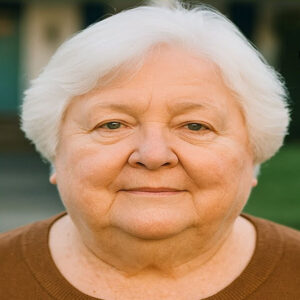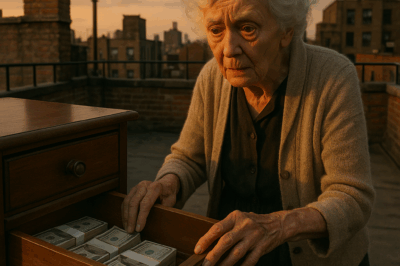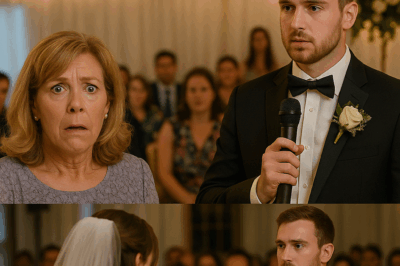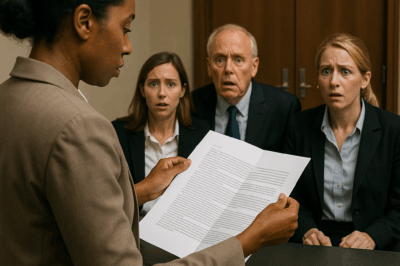Get out. You are ugly. I do not want you here. I held the phone on Tuesday evening in March, listening to my 34year-old son tell me I couldn’t come to his wedding. Mom, you have to understand Michael’s voice carried that patronizing tone he developed since dating Rebecca. This is Rebecca’s dream wedding. Everything has to be perfect. Of course, honey.
I’ve already picked out a nice dress. Nothing flashy, just something appropriate for her. That’s just it, Mom. He cut me off and I could practically hear him wincing through the phone. Rebecca and I have been talking and we think, well, we think you might not fit the aesthetic. We’re going for the aesthetic.
as if his wedding was a magazine spread, and I was a piece of furniture that clashed with the decor. “What do you mean, Michael?” The silence stretched so long I thought the call had dropped. When he finally spoke, his words landed like physical blows. “You’re not. You’re not photogenic anymore, Mom.
You’ve aged a lot these past few years, and Rebecca’s family is very image conscious. Her father is paying for everything and they want the photos to be perfect. You understand, right? I understood that the woman who had given birth to him, who had sacrificed everything for him, who had worked herself into exhaustion to give him every opportunity, was now too ugly to witness his happiness.

Michael, my voice came out smaller than I intended. I’m your mother. I know and I love you for everything you’ve done, but this is about starting my new life with Rebecca. She thinks we both think it might be time to consider some long-term care options for you anyway.
There are some really nice facilities where you could have companions your own age, activities, proper medical care, a nursing home at 68 with nothing wrong with me but gray hair, laugh lines, and hands that showed the honest work they’d done. You want to put me in a home so I won’t embarrass your bride. Mom, don’t be dramatic. It’s not like that. But it was exactly like that.
Rebecca had come into our lives two years ago like a perfectly manicured tornado. And I’d watched my son transform into someone I didn’t recognize. Gone was the boy who used to call me every Sunday, who brought me flowers on Mother’s Day, not because he had to, but because he wanted to.
In his place stood this stranger who spoke about aesthetics and image as if they were more important than the woman who’d given him life. I thought about all the sacrifices. The college fund I’d drained to pay for his MBA. The down payment I’d helped him with for his first house. The countless times I’d babysat his neighbors kids for extra money just so he could have name brand sneakers like the other children.
the way I’d smiled through my own loneliness, never dating, never remarrying because I didn’t want to complicate his life with a stepfather. Rebecca’s right, you know, he continued, warming to his theme now that I hadn’t hung up. You’ve been isolated since you retired. It’s not healthy. At Sunset Manor, you’d have social activities, proper meals, medical supervision.
We’ve already looked into it. They have an opening next month. Next month. They’d already looked into it. And what if I say no? Another silence. Then mom, you can’t live independently forever. Rebecca and I are starting a family soon, and we won’t have time to keep checking on you. This is what’s best for everyone. What’s best for everyone.
as if I were a problem to be solved rather than a person who devoted 34 years of her life to making sure he became the man he was today. I hung up without saying goodbye. That night, I sat in the kitchen of the small house I’d scrimped and saved to buy after Michael left for college. It wasn’t much. Two bedrooms, one bathroom, a kitchen barely big enough for a table, but it was mine.
I’d painted every wall myself, refinished the hardwood floors on my hands and knees, planted the garden that now bloomed with roses and tomatoes each summer. I looked at the refrigerator covered with photos of Michael through the years. His first day of school, gaptothered and grinning, his high school graduation, college graduation, the day he got his first promotion.
In every photo, I was there beside him, beaming with pride. How had I become too ugly for his happiness? I pulled out a bottle of wine I’d been saving for a special occasion and poured myself a glass, then another. As the wine warmed my empty stomach, I felt something shift inside me. Not just hurt. I’d expected that, but something harder.
something that tasted like 34 years of unrescrocated devotion curdling into something entirely different. I walked to my bedroom and pulled out the bottom drawer of my old dresser. Buried beneath sweaters I’d knitted but never wore manila folders I hadn’t touched in months, bank statements, property deeds, investment portfolios. Michael thought he knew his mother.
He thought I was just a lonely old woman whose greatest accomplishment was raising him. He had no idea what I’d been quietly building all these years, preparing for the day when I’d no longer be able to work, when I’d need security in my old age. He had no idea that the mother he considered too ugly for his perfect wedding was worth more than he could imagine.
And as I sat there surrounded by documents that told the real story of my life, the story of a woman who’d planned, saved, and invested with the same determination she’d once used to build a life for her ungrateful son. I began to smile. If Michael wanted to start fresh with his new life, if he wanted to erase me from his perfect picture, then perhaps it was time he learned exactly what he was giving up. Perhaps it was time for his mother to start fresh, too.
The morning after Michael’s call, I spread everything out on my kitchen table like pieces of a puzzle that had taken me decades to assemble. Bank statements, property deeds, stock certificates, insurance policies, the paper trail of a life lived more carefully than anyone, including my son, had ever realized. Most people saw what Michael saw.
A tired woman in discount store clothes, clipping coupons, driving a 10-year-old Honda living in a modest house in an unfashionable neighborhood. What they didn’t see was the method behind what looked like mere frugality. The first property deed was for a small duplex I’d bought 15 years ago, just after Michael started college.
The seller was desperate. A divorce needed cash fast, and I’d swooped in with an offer that was fair but immediate. I’d used the money from selling my late mother’s engagement ring and the small inheritance she’d left me. Money I’d never told Michael about because I knew he’d have ideas for how to spend it.
The duplex was in a neighborhood everyone said was transitional, which is real estate code for poor now, but probably not forever. I’d rented out both units to cover the mortgage and maintenance, living off my cleaning wages while the property slowly, steadily appreciated. Then there was the second property, a small commercial building I’d bought 8 years later.
The previous owner was an elderly man whose children lived out of state and wanted nothing to do with managing rental property. I’d approached him directly. Cash offer again, below market value, but with a quick closing. Three small businesses rented space there, a tax preparation service, a nail salon, and a sandwich shop. Nothing glamorous, but all reliable.
All paying rent that went straight into my savings after covering the mortgage. The third property had been my boldest move. a four-unit apartment building in what used to be called the wrong side of town until the young professionals discovered they could afford twice the space there for half the price.
I bought it 3 years ago just before the neighborhood really started turning around. The mortgage was higher, but so was the rental income. The building was now worth nearly double what I’d paid. All told, my real estate portfolio was worth just over 1.2 2 million. But that wasn’t all. I’d been investing in index funds for 20 years, putting away every spare dollar after my frugal living expenses were covered.
Nothing fancy, nothing risky, just steady, boring investments that grew year after year while I continued to live like a woman with nothing. The portfolio was worth another $800,000. Then there were the life insurance policies. Three of them actually. The first was a modest policy I’d bought when Michael was young, just enough to ensure he’d have something if anything happened to me.
But as the years passed and my other investments grew, I’d bought two larger policies using part of my real estate income to pay the premiums. Total death benefit $500,000. My checking account, the one Michael probably assumed held my meager social security and pension, actually contained $127,000. My savings account held another $200,000. Altogether, I was worth just over $2.
6 million. I’d built this fortune not out of greed, but out of fear. Fear of being dependent. Fear of being a burden. fear of ending up in some state-run facility if I couldn’t care for myself. Ironically, the very independence I’d worked so hard to secure was exactly what my son now wanted to take away from me.
The money had been my secret, my security blanket, my insurance against an uncertain future. I’d planned to tell Michael about it eventually, maybe when I turned 70. Maybe when I actually did need help. I’d imagined his surprise, his pride that his mother had been more capable than he’d realized.
I’d imagined him understanding that all those years of secondhand clothes and generic groceries hadn’t been about deprivation. They’d been about building something lasting. Now, sitting at my kitchen table with 20 years of careful planning spread before me, I felt something I hadn’t experienced in decades. Power. Michael wanted me out of his life because I was an embarrassment.
Rebecca wanted me in a nursing home because I was an inconvenience. Neither of them had any idea that the shabby old woman they were trying to discard had more money than they’d likely ever see. I picked up the will I drafted 5 years earlier. It was simple, straightforward. I leave my entire estate to my beloved son, Michael Patterson.
knowing he will use it wisely to build the life I always dreamed he would have. How naive that seemed now. How foolishly sentimental. I reached for the phone and dialed a number I’d memorized but never used. Franklin and Associates, how may I help you? This is Dorothy Patterson. I need to schedule an appointment with Mr.
Franklin to revise my will. Let me check his calendar. Would Thursday at 2:00 work? Thursday. That gave me two days to decide exactly how to rewrite my life’s work, how to redirect the fortune I’d spent 20 years building away from the son, who decided I was too ugly to love.
After I hung up, I called my oldest friend, Helen Morrison. Helen and I had worked together at Morrison Office Services for 15 years before I started my own small cleaning business. She was the only person who knew about my investments, the only one who’d been there the day I signed the papers on my first property purchase. Dorothy, is everything okay? You sound strange.
I told her about Michael’s call, about the wedding, about the nursing home. Helen had met Michael dozens of times over the years. Had watched me sacrifice for him, had bitten her tongue when I chose his needs over my own again and again. When I finished, she was quiet for a long moment.
Honey, she finally said, I’ve been waiting for this phone call for years. What do you mean? I mean, I’ve been waiting for you to see what the rest of us have seen for a long time. That boy has been taking advantage of your love since he was old enough to manipulate. Remember when he was 16 and needed money for that school trip? I remembered. I’d worked double shifts for 2 months to pay for it.
And when he was 25 and needed help with his car payment, I’d given him money I’d been saving for a small vacation, the first real trip I’d planned in years. and when he was 30 and needed. I know, Helen. I know. Do you? Because you’ve been blind to it for so long. I wasn’t sure you’d ever see clearly.
He’s never seen you as a person, Dorothy. Just as a resource, a source of money, emotional support, unconditional love that he never had to earn or reciprocate. She was right. And I’d known it somewhere deep inside. But I’d buried that knowledge under layers of maternal devotion and hoped that someday he’d grow into the man I’d raised him to be. “What are you going to do?” Helen asked.
I looked at the will again at those naive words about my beloved son. “I’m going to change my will.” I said, “I’m going to give my money to people who actually need it.” Good for you. And then what? I thought about that for a moment. What came after rewriting the will? What came after 20 years of planning for a future that would no longer exist the way I’d imagined? I don’t know yet, I admitted.
But for the first time in 34 years, I’m going to find out what it’s like to make decisions based on what I want instead of what Michael needs. The freedom in that statement was both exhilarating and terrifying. I’d been a mother for so long, I wasn’t sure I remembered how to be anything else.
But as I looked at the documents spread across my table, proof of the woman I’d been quietly becoming while playing the role of devoted mother, I realized I was about to find out. James Franklin’s office smelled like leather and old money, which seemed appropriate given what I was about to do.
He was a small man in his 60s with kind eyes and the patient demeanor of someone who’d spent decades listening to people’s most private affairs. I’d chosen him 5 years ago when I first had my will drafted because he came recommended as discreet and thorough, but I never imagined I’d be back to unravel everything I’d previously put in place. “Mrs. Patterson,” he said, settling behind his mahogany desk.
When you called to schedule this appointment, you mentioned wanting to make substantial changes to your will. Before we begin, I want to make sure this is something you’ve thought through carefully. Estate planning decisions made in emotional states often lead to regret. I’d expected this. James Franklin hadn’t built his reputation by letting clients make rash decisions they’d later want to reverse. Mr. Franklin, I’m 68 years old.
I’ve had 4 days to think about this, but honestly, I’ve been thinking about it for much longer than that. My circumstances have changed, and my will needs to reflect reality, not wishful thinking. He opened my file and reviewed the existing will, the one that left everything to Michael. This is a substantial estate.
When we drafted this, you mentioned you’d built it with your son’s future in mind. That was before I learned what my son actually thinks of me. I told him about the phone call, about being too ugly for the wedding, about the nursing home. James Franklin was a professional who’d probably heard every family dysfunction imaginable. But I saw something flicker across his face.
disgust maybe, or recognition of a story he’d heard too many times. “I see,” he said quietly. “And you want to remove your son as beneficiary entirely?” “Completely. I want to redirect my entire estate to the Women’s Educational Foundation.” The Women’s Educational Foundation was an organization I’d been quietly supporting for years with small donations.
They provided scholarships and job training for women trying to escape abusive relationships or rebuild their lives after divorce or widowhood. Women like I might have been if I’d been brave enough to prioritize my own needs earlier. That’s a significant charitable bequest. The foundation will be quite surprised, I imagine.
I hope they’ll put it to good use. There are a lot of women out there who need a second chance, who need to know they can build something for themselves, even when everyone around them says they’re not worth investing in. James Franklin made notes on a legal pad.
And you’re certain about this? Once we execute new documents, your previous will becomes invalid. If something were to happen to you, your son would inherit nothing. Nothing is exactly what he’s earned. We spent the next 2 hours going through every detail. I wanted the will to be ironclad with no possibility for Michael to contest it successfully.
James Franklin suggested additional documentation, a video recording of me explaining my reasoning, letters to be opened after my death that would make my intentions clear. He wanted to be absolutely certain that when the time came, there would be no doubt about my mental capacity or decision-making ability. There is one more thing I said as we were finishing up. I want to include a letter to my son. Something to be delivered with the will.
What kind of letter? I’d been thinking about this since the night he called. I want him to understand what he’s lost. Not just the money. I want him to know who I really was, what I accomplished, what I sacrificed. I want him to know that the woman he considered too ugly to acknowledge was worth more than he ever imagined.” James Franklin nodded.
“We can arrange for that. I’ll have my secretary prepare the documents for your signature next week, and we can record your video statement at that time.” As I was gathering my purse to leave, he looked at me with an expression I couldn’t quite read. Mrs.
Patterson, if you don’t mind my asking, and feel free not to answer. What are your plans now? You’re making this change to your will, but you’re still a relatively young woman with many years ahead of you. It was a good question, one I’d been asking myself.
What did you do with the rest of your life when you’d spent so many years living it for someone else? I’m not sure, I said honestly. For the first time in my adult life, I get to find out. The following week, I returned to sign the new will and record my video statement. Sitting in front of James Franklin’s camera, looking directly into the lens, I spoke clearly about my decision. My name is Dorothy May Patterson and I am of sound mind and body as I make these statements.
I am changing my will not out of temporary anger but out of clarity about the relationship between myself and my son Michael Patterson. For 34 years I believed that unconditional love meant accepting whatever treatment I received in return. I believed that being a good mother meant sacrificing my own needs, my own dignity, my own worth for my child’s benefit. I was wrong. Love should be reciprocal.
Respect should be earned and given in return. The man I raised has made it clear that he sees no value in me beyond what I can provide him, and that he considers my very existence an embarrassment to his new life. Therefore, I am leaving my estate to an organization that helps women build better lives for themselves. Women like the woman I should have been brave enough to be years ago.
Women like the woman I’m finally becoming now. Michael, if you’re watching this, know that you had a choice. We all did. You chose to see me as disposable. I’m choosing to dispose of the life I built around that illusion. After the recording, I felt both empty and full at the same time.
Empty of the old dreams, full of possibility I hadn’t allowed myself to imagine. Helen was waiting for me at the coffee shop down the street from the lawyer’s office. She had offered to come with me for moral support, but I’d wanted to handle it alone. Now, I was glad to see her familiar face. “How do you feel?” she asked. “Free?” I said and was surprised to realize it was true.
Scared but free. Good. You should be scared. You’re about to find out who Dorothy Patterson is when she’s not busy being Michael Patterson’s mother. What if I don’t like who that is? Helen smiled. Honey, you’ve been hiding her under a bushel for 34 years. I have a feeling she’s going to surprise you.
As we sat there drinking coffee, I found myself thinking about practical things. I didn’t want to stay in the same town, in the same house where I’d spent so many years waiting for Michael to visit or call. I didn’t want to keep living the small life I’d built around his needs.
Helen, I said suddenly, how do you feel about traveling? What do you mean? I mean, what if we took a trip? A real trip, not just a weekend somewhere. What if we went to Europe or Australia or somewhere we’ve always talked about but never gone? Helen’s eyes lit up. Dorothy Patterson, are you suggesting we become jet setting ladies of leisure? Why not? I’ve got more money than I knew what to do with when I was planning to leave it to Michael.
If I’m going to spend it on something worthwhile, why shouldn’t that something be living the life I never let myself have? For the first time since Michael’s phone call, I felt something that wasn’t anger or hurt or determination. I felt excitement. The future, which had looked so bleak and limited just a week ago, suddenly seemed wide open.
But first, there was one more thing I needed to do. One last gift I wanted to give my son. I wanted him to have one perfect day, his wedding day, before he learned what his cruelty had cost him. I wanted to sit in that church in the back row where his bride’s aesthetic wouldn’t be disturbed and watch him smile his biggest smile. I wanted to see him believe that he’d successfully discarded the inconvenient parts of his old life.
And then I wanted to hand him an envelope that would teach him the difference between what you think you’re throwing away and what you’ve actually lost. The wedding was still 3 weeks away. That gave me time to plan my final performance as Michael Patterson’s mother. I woke up on Michael’s wedding day feeling calmer than I had in months.
For 3 weeks, I’d been planning this moment, and now it was finally here. The morning sun streamed through my bedroom window, illuminating the dress I’d chosen for the occasion. A simple navy blue sheath dress with a matching jacket. Elegant, but not attentiongrabbing. The kind of outfit that would photograph well from a distance, but wouldn’t upstage the bride.
I’d had my hair done the day before at a salon I’d never used, spending more on a cut and style than I usually spent in 6 months. The stylist, a young woman named Carmen with genuine warmth in her eyes, had worked magic with my gray hair, giving it shape and shine I hadn’t seen in years.
“You look beautiful,” she’d said when she finished. “Whatever this is for, you’re going to be stunning.” “If only she knew.” I’d also gone shopping for the first time in years. Really shopping, not just picking up necessities at discount stores. I’d bought new shoes, a new purse, even new underwear because somehow starting over seemed to require being new from the inside out.
The woman in my mirror looked like someone who belonged at a society wedding, someone with dignity and presence. Too bad Michael would never get the chance to introduce me. At 9:00, I called a taxi. I’d briefly considered driving myself, but I wanted today to be different from every other day I’d spent as Michael’s mother.
Today, I was a guest, not just an obligation. The church was beautiful, one of those historic downtown churches with soaring ceilings and stained glass windows that cast rainbow patterns across the stone floors. Rebecca’s family had clearly spared no expense. White roses and baby’s breath adorned every pew, and yards of white silk ribbon created an aisle that looked like a pathway to heaven.
I took a seat in the very back row, just as Michael had undoubtedly hoped I would if I came at all. From here, I could see everything without being seen. The ushers in their matching tuxedos. The guests in their carefully chosen outfits. The photographer who moved around like a dancer, capturing every angle of Rebecca’s perfect day.
Helen had wanted to come with me, but I told her this was something I needed to do alone. She’d hugged me extra tight when she dropped off the envelope that morning. the envelope that now sat in my purse like a small bomb waiting to detonate. As the church filled with guests, I recognized some faces from Michael’s past. His college roommate, now a successful lawyer, his first boss who’d always sent me Christmas cards. Some neighbors from the house where he’d grown up.
These were people who’d known me when I was still visible in Michael’s life before Rebecca had helped him understand that his past was something to be managed rather than celebrated. A few of them saw me and waved, confused expressions crossing their faces. They probably wondered why I was sitting alone in the back instead of in the front row where the mother of the groom belonged.
I smiled and waved back, giving no indication that anything was a miss. Rebecca’s family took up the first three rows on the bride’s side. Aunts, uncles, cousins, grandparents, all dressed like they’d stepped out of a wedding magazine. Her father, a distinguished man in his 60s with silver hair and a perfect tan, kept checking his watch with a nervous energy of someone who’d invested heavily in making sure everything went according to plan.
On Michael’s side, the first row sat empty except for his best man’s parents. The mother of the groom’s row, traditionally the place of honor, remained vacant like a missing tooth in an otherwise perfect smile. At exactly 11:00, the music began.
The bridal march filled the church with its familiar promise of new beginnings and happy endings. The congregation rose and I rose with them, watching as Rebecca appeared at the back of the church like a vision in white silk and French lace. She was beautiful, I had to admit. 28 years old with long blonde hair and the kind of naturally perfect features that looked good from every angle.
Her dress probably cost more than I used to make in 6 months. and she moved down the aisle with the confidence of someone who never doubted she deserved the very best life had to offer. But it was Michael I couldn’t stop watching. He stood at the altar in his perfectly tailored tuxedo, his dark hair styled with just the right amount of product, his face glowing with joy and anticipation. This was what happiness looked like on my son.
pure, uncomplicated, unaware of any shadow or complexity. He looked like a man who’d successfully arranged his life exactly as he wanted it, who’d removed all obstacles to his perfect future. As Rebecca reached the altar and took his arm, Michael’s smile was so bright it could have powered the church.
This was the smile I’d lived for during all those years of sacrifice. The smile that had made every double shift and secondhand purchase worth it. Seeing it now, knowing what I knew, felt like watching a beautiful sunset before a hurricane. The ceremony was everything a high society wedding should be. Elegant, traditional, flawlessly executed.
The minister spoke about love and commitment, about building a life together, about the importance of family and the bonds that endure beyond all challenges. Michael and Rebecca exchanged vows they’d written themselves, promising to love and honor each other, to put each other first, to build a future based on trust and mutual respect.
I wondered if Michael heard the irony in his own words. When the minister pronounced them husband and wife, when Michael kissed his bride and the congregation erupted in applause, I felt a strange mixture of emotions. Pride. He looked so handsome, so happy. Loss. This should have been a moment we shared. A culmination of all the years I’d invested in his future.
And something else, something that felt like completion. This was the last time I would ever see my son smile with uncomplicated joy. In about an hour, everything would change for him, and it would be my doing. Part of me, the part that had spent 34 years protecting him from every disappointment, wanted to tear up the envelope in my purse and let him keep his illusions.
But the stronger part, the part that had finally learned the difference between love and self-destruction, knew this was necessary for him and especially for me. The recessional began, and Michael and Rebecca walked back down the aisle as husband and wife. As they passed my row, Michael’s eyes swept the congregation, accepting congratulations and well-wishes from their guests.
For just a moment, his gaze landed on me, I saw the shock register on his face. Surprised that I’d actually come, confusion about why I was sitting in the back, a flicker of what might have been embarrassment, as he realized some of his guests had probably wondered why his mother wasn’t in the family section.
But his new wife was pulling him forward, and the photographer was calling for pictures, and the moment passed. Michael’s attention returned to his perfect day, and I became invisible again, exactly as he’d wanted. The receiving line formed in the Narthx, and I waited until most of the guests had offered their congratulations before approaching. Rebecca was radiant in her white dress, accepting compliments and admiration like someone accustomed to being the center of attention.
Michael stood beside her, one hand on her waist, playing the role of devoted husband with natural ease. When they saw me approaching, I watched a quick conversation pass between them in glances. Rebecca’s smile became slightly more fixed, and Michael straightened his shoulders like someone preparing for an unpleasant but manageable task. “Mom,” he said when I reached them. You came? Of course I came. You’re my son.
Rebecca extended her hand with the gracious smile of someone who’d been taught good manners from birth. Mrs. Patterson, thank you so much for being here. You look lovely. She was lying, of course, but she was lying beautifully the way people do when good breeding demands politeness regardless of personal feelings. Thank you, Rebecca.
You make a beautiful bride. Michael is very lucky. We both are, Michael said, and I heard the message beneath his words. Lucky to have each other. Lucky to be starting fresh. Lucky to be free of complications from the past. I reached into my purse and pulled out a small wrapped gift. A silver picture frame I’d bought specifically for this moment.
Just a little something for your new home. Thank you, Rebecca said, accepting the gift with another perfect smile. That’s so thoughtful. What they didn’t see was me palming the envelope for my purse as I handed over the gift. What they didn’t notice was me slipping it into Michael’s tuxedo jacket when I leaned in to give him a congratulatory hug.
I’m so proud of you,” I whispered in his ear and meant it. I was proud of the man he’d become, even if that man no longer had room in his life for the woman who’d made him possible. “Thanks, Mom,” he whispered back. And for just a moment, he sounded like the little boy who used to crawl into my bed during thunderstorms.
Then Rebecca was pulling him away to greet more guests, and I was forgotten again. just another well-wisher in a long line of people celebrating their perfect beginning. I made my way toward the exit, stopping to chat briefly with old acquaintances, accepting compliments on how well I looked, deflecting questions about why I wasn’t sitting with family.
To everyone else, I probably seemed like a proud mother who’d raised a successful son and now was graciously stepping back to let him build his new life. If only they knew. As I waited for my taxi outside the church, I thought about the envelope now burning in Michael’s jacket pocket. Inside was a letter I’d written and rewritten a dozen times and a business card for James Franklin with a note to call him first thing Monday morning.
By Tuesday, my son would know exactly what his cruelty had cost him. By Tuesday, the mother he’d considered too ugly to acknowledge would be officially dead to him. By Tuesday, I would be free. I didn’t have to wait until Tuesday. Helen called me at 8:30 Sunday morning, her voice tight with barely controlled excitement. Dorothy, turn on your phone.
Turn on everything. Check your email, your voicemail, all of it. I’d spent Saturday evening and Sunday morning in deliberate isolation, phones turned off, curtains drawn, existing in the peaceful bubble of a decision made and consequences set in motion.
I’d known that once Michael found the envelope, and he would find it, probably while changing out of his tuxedo at the hotel, my quiet life would explode into chaos. I’d wanted one last night of peace before the storm. Now the storm had arrived. My voicemail was full. 17 messages, all from Michael, starting calm and escalating into something approaching hysteria.
I listened to them in chronological order, watching my son’s perfect wedding day disintegrate in real time. Message 1. Saturday evening, 7:15 p.m. Mom, I found your envelope. Very funny. Call me back so we can talk about this like adults. He thought it was a joke. A manipulation maybe designed to get his attention. He had no idea. Message 3.
Saturday, 8:45 p.m. Mom, I called James Franklin’s emergency line. He won’t tell me anything until Monday, but he confirmed you were his client. What the hell is going on now? He was starting to understand this wasn’t a game. Message 7. Saturday, 11:30 p.m. $2.6 million. Are you insane? Where did this money come from? How long have you been lying to me about about everything? The disbelief in his voice was almost funny.
My son, who thought he knew everything about his poor, pathetic mother, discovering she’d been living a completely different life than the one he’d imagined. Message 12, Sunday, 2:15 a.m. Rebecca’s father knows about this. Someone saw your letter and now her whole family knows you were at the wedding to to what? Humiliate us? Rebecca’s locked herself in the bathroom. She won’t even look at me. What have you done? Ah.
So, word had spread. Somehow, the contents of my letter had become public knowledge at the reception. I wondered if Michael had been careless or if someone had seen him reading it and demanded to know what was wrong. Either way, my final gift to him had been even more public than I’d planned. Message 17. Sunday 7:45 a.m.
I’m coming over. We’re going to fix this. Whatever’s wrong with you, whatever I did, we can work it out. You can’t just destroy my life because you’re angry about the wedding. This is insane. Mom, you’re acting insane. I wasn’t acting insane. For the first time in decades, I was acting sane. Helen arrived before Michael did, carrying coffee and pastries and the fierce loyalty of a friendship that had weathered decades.
She found me sitting calmly at my kitchen table, still in my robe, looking remarkably peaceful for someone who just detonated her son’s life. “Tell me everything,” she said, settling into the chair across from me. I told her about the letter, how I’d written it to explain not just what he was losing, but who he was losing.
How I’d detailed every sacrifice, every property purchase, every investment decision made with his future in mind. How I’d explained that the shabby old woman he was embarrassed to claim had built a fortune that would have secured his children’s children’s futures. and now it’s all going to help other women instead,” Helen said with satisfaction.
“Every penny, what about Rebecca?” I almost laughed. According to Michael’s messages, Rebecca’s father is reassessing the marriage. Apparently, marrying a man whose mother publicly humiliated him at his own wedding isn’t the social coup they thought they were making, especially when that mother turns out to have more money than they do. The doorbell rang at 9:15.
Through the peepphole, I could see Michael pacing on my front porch, still wearing his tuxedo pants and dress shirt from the night before, his bow tie hanging loose around his neck. His hair was disheveled, his eyes redimmed. He looked like a man who’d spent his wedding night in hell. Good. I opened the door and stepped aside to let him in.
He brushed past me into the living room, spinning around to face me with a wild energy of someone running on adrenaline and desperation. Mom, what have you done? Hello, Michael. How was your wedding night? He stared at me as if I were speaking a foreign language. My wedding night? My wedding night was spent explaining to my wife’s family why my mother ambushed us with some insane story about secret millions and revenge schemes.
Rebecca won’t even talk to me. Her father is talking about anulment. My life is destroyed. I’m sorry to hear that. You’re sorry? His voice cracked. You’re sorry. You orchestrated this. You planned this whole thing. I walked to my chair, the same chair where I’d sat listening to him tell me I was too ugly for his happiness, and settled myself calmly.
Would you like some coffee? Coffee? Are you completely insane? I want to know where you got $2.6 million, and I want to know why you’re giving it away to strangers instead of your own son. Helen, who’d been watching this exchange from the kitchen doorway, stepped forward.
Maybe because your son told her she was too ugly to come to his wedding. Michael’s head whipped toward her. This is between me and my mother. No, Helen said quietly. This is between a woman and the child who threw her away the moment she became inconvenient. You don’t understand. I understand perfectly. I’ve watched Dorothy sacrifice everything for you for 34 years.
I watched her work double shifts to pay for your college. I watched her give you down payment money for your house while she kept driving that old car. I watched her turn down every social invitation, every chance for her own happiness because she was always available in case you needed something. Michael looked between us and I could see him realizing that this wasn’t just about the wedding, wasn’t just about Rebecca’s aesthetic preferences.
This was about a pattern he’d never bothered to examine. “Mom,” he said, his voice softer now, pleading. “I know I handled the wedding wrong. I was trying to keep peace with Rebecca’s family, trying to make sure everything went smoothly. I never meant to hurt you, but you did hurt me, Michael. And more importantly, you showed me exactly how you see me.
Not as a person deserving respect and love, but as a problem to be managed. That’s not true, isn’t it? When’s the last time you called me just to see how I was doing? When’s the last time you asked about my life, my interests, my dreams? When’s the last time you treated me like someone whose feelings mattered? He opened his mouth to answer, then closed it again.
We both knew the answer. The nursing home. Michael, you and Rebecca had already looked into putting me in a nursing home because I was inconvenient because an elderly woman with my own life and opinions didn’t fit into your perfect picture. We thought it would be better for you. You thought it would be better for you.
I stood up suddenly tired of this conversation. Tired of explaining basic human decency to the man I’d raised to be better than this. You thought it would be easier to park me somewhere out of sight so you wouldn’t have to think about me anymore. Michael sank into my couch, his head in his hands. What do you want me to do? How do I fix this? It was the question I’d been waiting for.
And the answer came easier than I’d expected. You can’t fix this, Michael. Some things, once broken, can’t be put back together. But I love you. You’re my mother. Love isn’t just a feeling, sweetheart. It’s how you treat people. It’s how you prioritize them in your life. It’s whether you make space for them, even when it’s inconvenient.
I moved toward the window, looking out at the garden I’d planted, the life I’d built. You don’t love me, Michael. You love the idea of me, the devoted mother who exists to serve your needs and asks for nothing in return. That’s not fair. Fair. I turned back to face him.
Was it fair that I worked 60our weeks so you could have name brand clothes? Was it fair that I never dated? never remarried because I didn’t want to complicate your life with a stepfather. Was it fair that I gave you every opportunity to build the life you wanted while I built nothing for myself? Helen cleared her throat. Dorothy, I think you should tell him about Tuesday. Michael looked up sharply.
What about Tuesday? I’ve been planning to let him find out from James Franklin. But looking at my son now, disheveled, desperate, finally beginning to understand the magnitude of what he’d lost, I realized I wanted to deliver this news myself. Tuesday, I’m meeting with a realtor about selling this house.
Wednesday, I’m closing my bank accounts and transferring everything to my new accounts in Switzerland. Thursday. I’m flying to Europe with Helen for an indefinite stay. The color drained from Michael’s face. You’re leaving? I’m starting over. At 68, I’m finally going to find out what it’s like to live for myself instead of for someone who doesn’t appreciate the sacrifice.
But what about what if you get sick? What if you need help? I’ll hire. I can afford it now that I’m not supporting an ungrateful child. Michael stood up abruptly, pacing again. This is insane. You can’t just disappear. You can’t just abandon your family. The irony was so thick I almost choked on it.
Michael, you already abandoned me. You just expected me to sit quietly in whatever corner you assigned me until you decided you needed something. But the money, the money is going to women who actually need it. Women who are trying to rebuild their lives after men. Like you decided they were disposable. Men like me. His voice rose again. I’m not some monster.
I made one mistake. No, Michael. You made a thousand small mistakes every day for years. The wedding was just the day you finally said out loud what your actions had been telling me all along. He looked around my small house as if seeing it for the first time, really seeing it.
The modest furniture, the carefully maintained everything, the life lived small so his could be large. I had no idea about the money. Why didn’t you ever tell me? because I was saving it for my old age for the day I couldn’t take care of myself. I was trying to make sure I’d never be a burden on you. I smiled sadly. Turns out I was already a burden, just not a financial one.
Michael was quiet for a long moment. When he finally spoke, his voice was barely a whisper. Can’t we start over? Can’t we try again? For just a moment, looking at him sitting there in his wrinkled wedding clothes, I saw the little boy who used to climb into my lap for bedtime stories. The teenager who brought me dandelions and called them flowers.
The young man who used to tell people his mom was his hero. I’m 68 years old, Michael. I don’t have time to wait for you to grow into the man I tried to raise you to be. The finality in my voice must have reached him because he started crying then deep wrenching sobs that shook his whole body. I’m sorry, Mom. I’m so sorry. Please don’t do this. Please don’t leave me. But it was too late for sorry.
Sorry was what you said before you destroyed someone’s life, not after. Helen appeared at my elbow. Dorothy, we should go. The realtor is coming at 11. I nodded, grateful for the escape. I couldn’t watch Michael cry without feeling the old instinct to comfort him, to fix his pain, even when he’d caused mine.
As we headed for the door, Michael called out one last time, “Mom, please, I’ll do anything. I’ll make this right.” I paused with my hand on the doororknob. Michael, I spent 34 years trying to make you into someone who wouldn’t need to make this right. That was my choice. Now I’m making a different one.
We left him sitting in my living room, surrounded by the modest life I’d built while secretly creating something magnificent. By the time I returned that evening, he was gone. He left 17 more messages over the next few days, then 10, then five, then one just before my flight to Europe. Mom, I know you’ll probably never forgive me. I know I don’t deserve forgiveness, but I want you to know that I finally understand what I lost.
Not just the money you. I lost you. and I’m going to spend the rest of my life wishing I could take back that phone call. I listened to it sitting in the first class lounge at the airport, Helen beside me with our boarding passes to Switzerland. It was a good apology, heartfelt, specific, free of excuses. It was also about 20 years too late.
I deleted the message and turned off my phone. Dorothy Patterson was about to disappear forever and with her the last traces of the woman who’d loved Michael more than she’d loved herself. The funeral was beautiful. Helen told me later Michael had spared no expense. White roses, a mahogany casket, a minister who spoke movingly about a devoted mother who’d lived her entire life for her son.
The obituary in the local paper described Dorothy Patterson as a beloved mother and hard worker who’d passed peacefully after a brief illness. Of course, Dorothy Patterson wasn’t dead. She was sitting on a terrace in Montro, Switzerland, watching the sun set over Lake Geneva while sipping wine that cost more than her old monthly grocery budget. The cancer diagnosis had been real.
stage 2 breast cancer caught early during a routine mammogram I’d scheduled right after changing my will. The prognosis was excellent with treatment, but it had given me the perfect cover story for my disappearance. As far as anyone in my old life knew, Dorothy Patterson had died quietly in a private medical facility in Switzerland, her body cremated according to her final wishes.
Michael had tried to claim the body. Of course, James Franklin had gently explained that there was no body to claim, that his mother had chosen private cremation, and had left specific instructions that there be no service, no gathering, no fuss, just a simple end to a life that had been, in her final assessment, too much about other people and not enough about herself.
The truth was more complicated and more wonderful than death. After selling my house and settling my affairs, I’d liquidated everything I couldn’t take with me and quietly transfer the money to Swiss Accounts Helen and I had opened during a scouting trip the month before my supposed death. With my new passport legitimately obtained after legally changing my name to Dorothy Helen Morrison, taking Helen’s maiden name, I’d created a new identity that had no connection to Michael Patterson’s mother.
The hardest part had been the chemotherapy. Even with the excellent Swiss medical care my money could buy, six months of treatment had been brutal. But Helen had been with me through every session, every side effect, every moment of doubt about the drastic step I’d taken.
“Are you sure about this?” she’d asked during one particularly difficult week. “It’s not too late to go back. You could tell Michael you survived that you want to try again.” I’d considered it. During the worst of the treatment, when I was weak and scared and questioning everything, part of me wanted nothing more than to call my son and hear him say he loved me.
But then I’d remember the phone call, the wedding, the nursing home, the lifetime of taking me for granted. I’m sure I told her Dorothy Patterson needed to die so I could finally live. and live. I had once my treatment was complete and my health was restored, Helen and I had become those women we’d always talked about being but never quite had the courage to become.
We’d rented a beautiful apartment in Montro with a view of the lake and the Alps. We traveled to Italy, France, Germany, Austria, all the places we dreamed about during those long years of working and saving and putting everyone else’s needs first. I’d learned to paint. Helen had learned to speak French.
We’d both learned that 68 wasn’t too old to discover you were braver than you’d ever imagined. The money I’d transferred to the Women’s Educational Foundation had made headlines in my old hometown. Local woman leaves fortune to charity, read one newspaper article Helen had found online.
The foundation’s director had given interviews about the unexpected windfall and how they plan to use it to help hundreds of women get education and job training. Michael had been mentioned in those articles, too. described as the shocked survivor who’ had no idea about his mother’s wealth. One piece quoted him saying his mother had been a private woman who never spoke about financial matters and that he was proud she chose to help other women even though her decision came as a complete surprise. At least he’d learned to lie gracefully about our relationship. That
was something. Helen had shown me the articles during my recovery, and I’d felt a complex mix of emotions reading them. Pride that my money was already helping women rebuild their lives. Sadness that Michael was still performing the role of loving son even after I was supposedly dead.
And relief, overwhelming relief that I was free of the need to care about his performance. Do you ever miss it? Helen asked one evening as we sat on our terrace watching the lights come on across the lake. Being a mother, I considered her question carefully. I miss the little boy he used to be. I miss the relationship I thought we had, but I don’t miss being taken for granted.
I don’t miss making myself smaller so he could feel bigger. What about the guilt? Don’t you feel bad about letting him think you’re dead? That was harder to answer. I did feel guilty sometimes, usually late at night when I couldn’t sleep and my mind wandered to Michael. Was he grieving? Had losing me or thinking he’d lost me taught him anything about how he treated me? Did he ever think about the sacrifices I’d made? or did he just remember me as the crazy old woman who’d ruined his wedding? Sometimes I admit it.
But then I remember that he was already treating me like I was dead. At least now it’s honest. We’d been in Switzerland for 8 months when Helen suggested we take a trip back to the States, not to our old hometown. We both agreed we never wanted to see the place again, but to visit her daughter in California, maybe see some of the national parks we’d always talked about exploring. “What if someone recognizes you?” she’d asked.
“I’d looked in the mirror that morning and barely recognized myself. The elegant clothes, the professionally styled hair, the confidence that came from living for yourself instead of someone else. I looked like a completely different person than the tired woman who’d sat in the back row of Michael’s wedding.
Even if someone from my old life saw me, they’d probably dismiss the resemblance. People see what they expect to see, and no one expected Dorothy Patterson to be alive and thriving in expensive clothes and European sophistication. Let them look, I’d said. Dorothy Patterson is dead. I’m someone else entirely now. And I was. The woman I’d become had opinions she expressed freely, money she spent on her own pleasure, friendships she cultivated because she enjoyed them rather than because they served someone else’s needs. She read books for pleasure,
stayed up late because she wanted to, traveled wherever struck her fancy. She was, I realized, the woman I’d always been underneath all those years of self-sacrifice. She’d just been buried under so many layers of motherhood and duty and misguided love that I’d forgotten she existed.
On my first anniversary of being dead, Helen and I threw ourselves a party. We invited the friends we’d made in Switzerland, bought expensive champagne, and celebrated the death of women who’d lived their lives for other people and the birth of women who’d finally learned to live for themselves. To Dorothy Patterson, Helen toasted, raising her glass.
Who died so Dorothy Morrison could live. To Dorothy Patterson, I agreed. who loved so much she forgot to love herself. We drank to the woman who’d worked herself to exhaustion for an ungrateful son, who’d saved every penny for his future, who’d made herself invisible so he could shine. We mourned her briefly, but sincerely.
Then we drank to the woman who’d risen from her ashes. Wealthy, independent, free to discover who she was when she wasn’t defined by someone else’s needs. We celebrated her with a joy of people who’d waited 68 years to meet their true selves. That night, I dreamed about Michael for the first time in months.
In the dream, he was 7 years old again, crying because he’d scraped his knee falling off his bicycle. I cleaned the wound, put on a bandage, kissed it better, and watched him run back to his friends, completely recovered and completely confident that I would always be there to fix whatever went wrong. I woke up feeling peaceful rather than sad.
That little boy deserved to be loved unconditionally, protected, nurtured, celebrated. I’d given him all of that and more. The man he’d become had made his own choices about what to do with that foundation. Those choices had consequences, and one of those consequences was losing the woman who’d loved him more than life itself. I’d made my choices, too.
I’d chosen to love myself enough to walk away, to value my own dignity enough to demand respect, to believe I deserved better than being treated like an embarrassment by the person I’d sacrificed everything for. Looking out at Lake Geneva in the early morning light, I felt something I hadn’t experienced in decades.
Complete peace with my decisions. The woman who died at Michael’s wedding, the woman who’d spent her life being diminished and dismissed, was gone forever. In her place was someone who’d learned that it’s never too late to start over. Never too old to discover your own worth, never too frightening to choose yourself over people who don’t choose you. Michael thought his mother was dead.
And in a way, he was right. The mother he’d taken for granted, used up and thrown away, was gone. But the woman she’d always been underneath, strong, smart, capable of building something beautiful, was finally, gloriously completely alive. And she was never going back.
News
Mi Hijo Me Mandó A Vivir A La Azotea… No Imaginó Lo Que Encontré En El Último Cajón De Mi Esposo
Mi nombre es Rosario Gutiérrez, tengo 72 años y toda mi vida la dediqué a formar una familia Nachi en…
Gasté US$ 19.000 En La Boda De Mi Hijo — Lo Que Hizo Después Te Va a Impactar…
Gasté $19,000 en la boda de mi hijo. Pagué cada centavo de esa fiesta y en plena recepción él tomó…
Mi Hijo Me Prohibió Ir Al Viaje Familiar. Me Reí Cuando El Piloto Dijo: “Bienvenida a Bordo, Señora”
Esta viaje es solo para la familia”, me dijo Orlando con esa frialdad que me helaba la sangre. Yo estaba…
¡No deberías haber venido, te invitamos por lástima!” — me dijo mi nuera en su boda con mi hijo…
No deberías haber venido. Te invitamos por lástima”, me dijo mi nuera en su boda con mi hijo. Yo solo…
Esposo Me Acusa De Infiel Con Cinturón. 😠 Proyecté En Tv El Acto Íntimo De Su Suegra Y Cuñado. 📺🤫.
La noche más sagrada del año, la nochebuena. Mientras toda la familia se reunía alrededor de la mesa festiva, el…
Me DESPRECIARON en la RECEPCIÓN pero en 4 MINUTOS los hice TEMBLAR a todos | Historias Con Valores
Me dejaron esperando afuera sin saber que en 4 minutos los despediría a todos. Así comienza esta historia que te…
End of content
No more pages to load












